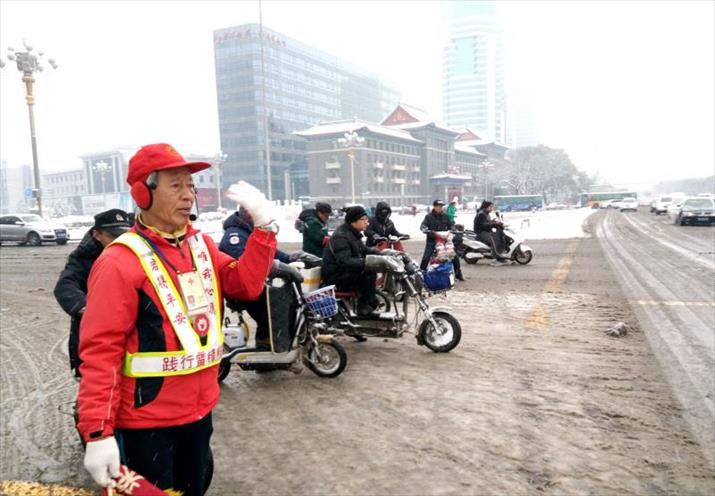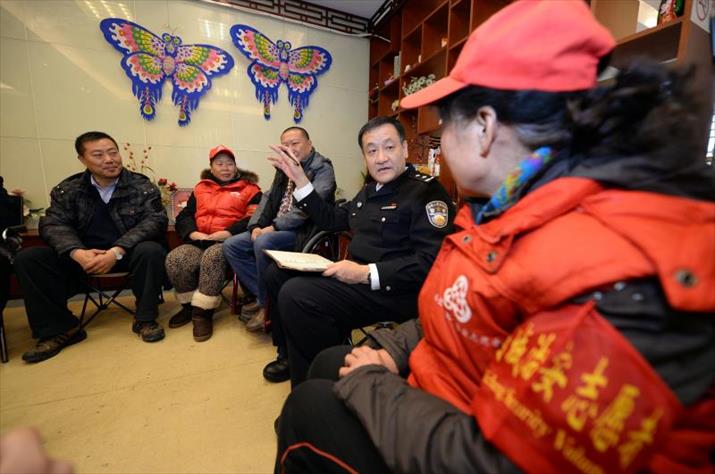|
||||||||||
| Home Nation World Business Opinion Lifestyle ChinAfrica Multimedia Columnists Documents Special Reports |
|
||||||||||
| Home Nation World Business Opinion Lifestyle ChinAfrica Multimedia Columnists Documents Special Reports |
| China |
| Turning Back the Clock |
| China's growing number of retirees find ways to continue contributing to society |
| By Xia Yuanyuan ·2017-05-18 |

It's seven o'clock in the morning, and Zhai Yuhong, 56, is on her beat in downtown Beijing. The feisty traffic coordinator takes her work seriously at the Zhanlanlu crossroad, doing her utmost to keep the movement of vehicles flowing smoothly. Zhai has been busy keeping order on the streets since she was retrenched from her state-owned factory job more than 10 years ago. As an early retiree she took up her position assisting the police with traffic control as a means to keep active.
"I am not a person who enjoys taking it easy. I felt at a loss when I was retired. I was sure I could do something else for society," Zhai told ChinAfrica.
Today, China, considered as one of the most economically energetic countries in the world, is also coping with the challenges of an aging society. In China, those aged 55 and above are considered "old people." The retirement age in the country is currently 60 for men, 55 for female white-collar workers and 50 for female blue-collar employees. According to an estimate of the National Health and Family Planning Commission, by 2020 there will be 255 million people above 60 years of age in China, accounting for 17.8 percent of the country's overall population. Defiant of any concerns about being a burden on society however, increasing numbers of senior citizens are still making contributions to society in various ways.
Keeping order
One of the most notable areas of these contributions is made by the traffic coordinators like Zhai. At peak traffic hours, this army of seniors has become iconic at all major intersections and bus stops in the Chinese capital. With a flag in hand, dressed in bright yellow jackets, they can be seen making gestures and guiding the streams of pedestrians, cyclists and motorbike riders to obey traffic rules. Although their income is meager and on-the-job weather conditions are often harsh, they persevere for the greater good. According to data from Beijing Traffic Management Bureau, the annual average number of traffic coordinators in Beijing is around 8,000 in recent years, and 80-90 percent of them are either retired or retrenched workers, aged between 50-60.
"Beijing is a city with a strong culture of inclusiveness. Many people from other cities know little about Beijing's roads and traffic rules," said Zhai, hinting at the need to often educate road users. She said she finds comfort in this responsibility.
Also providing a social service along with traffic coordinators are the legions of volunteers across Beijing affectionately called dama.
Dama, (aunt in Chinese), refers to middle-aged women. These ladies, especially those dama in the Xicheng District of Beijing, have on many occasions made headlines for preventing and curbing illegal and criminal activities.

Dama are easily spotted on the street with their red armbands or red hats and operate within their own neighborhoods of which they have intimate knowledge. As public safety volunteers they are there to assist the police in ensuring the safety of their communities.
According to information from Xicheng Government, in 2015, more than 70,000 residents in the district are involved in community work, which includes reporting suspicious activity to the police, with about 50,000 of these being registered volunteers. Most of them are women residents aged 58 to 65.
Value added
Apart from engaging themselves in volunteer work or social activities, some retired senior citizens, such as academics and technicians, manage to find new jobs.
Technician Tian Xiaoqing, 57, didn't like the thought of being idle when she retired two years ago. "It's the Internet age now. I can't allow myself to be swept aside by the tide of information," Tian told ChinAfrica. In April 2015, soon after she retired, Tian registered to be a cook on a home kitchen app called Huijia Chifan (Going Home for Meals), working by linking consumers with amateur work-at-home chefs, who cook dishes on demand, with delivery and logistics handled by the app operators.
Using the Huijia Chifan app, Tian offers home-made dishes for customers, especially for young office workers with little time or inclination to cook. "It's too tiring for young people to cook after a whole day's work. And it's unhealthy to order fast food. I hope the flavor of my dishes could offer them a taste of home," Tian said.
Tian's specialty dish is braised pork in brown sauce, for which she receives more than 10 orders daily. "I'm good at cooking and I love cooking. This is a good way for me to kill time and make some extra pocket money," Tian said. She makes an average net profit of 3,000 yuan ($435) per month.
To date, Huijia Chifan, Mamadecai (Mother's Dishes) and Cengfan (Neighbor's Meal) are the three home kitchen-sharing apps dominating China's larger cities. More than 4,000 people from some 100 communities in Beijing are currently using the Huijia Chifan app. Typically, the service providers tend to be retirees, housewives and cooking enthusiasts, with retirees constituting the highest proportion (about 40 percent).
Re-employment for people in technical and professional positions, who have reached retirement age, can prove beneficial to society, according to observers.
Yan Xue'an, 65, formerly a senior technician in a state-owned automobile enterprise, established an automobile repair plant with several friends in north China's Shanxi Province after he retired. Yan is familiar with automobile parts and his skills in repairing vehicles are often better than the younger mechanics.
"The value of life is to leave some shining points of you in other people's memory. Age is not a limitation for people to achieve this. Entrepreneurship is a passionate and happy process," Yan told ChinAfrica. "I will continue to work as long as my physical condition permits it."
Engaging in more work allows the elderly to have better self-esteem, raises their sense of identity, and alleviates their loneliness and depression, said Tao Liqun, research fellow at China Research Center on Aging.
|
||
| About Us | Contact Us | Advertise with Us | Subscribe |
| Copyright Beijing Review All rights reserved 京ICP备08005356号-5 京公网安备110102005860号 |